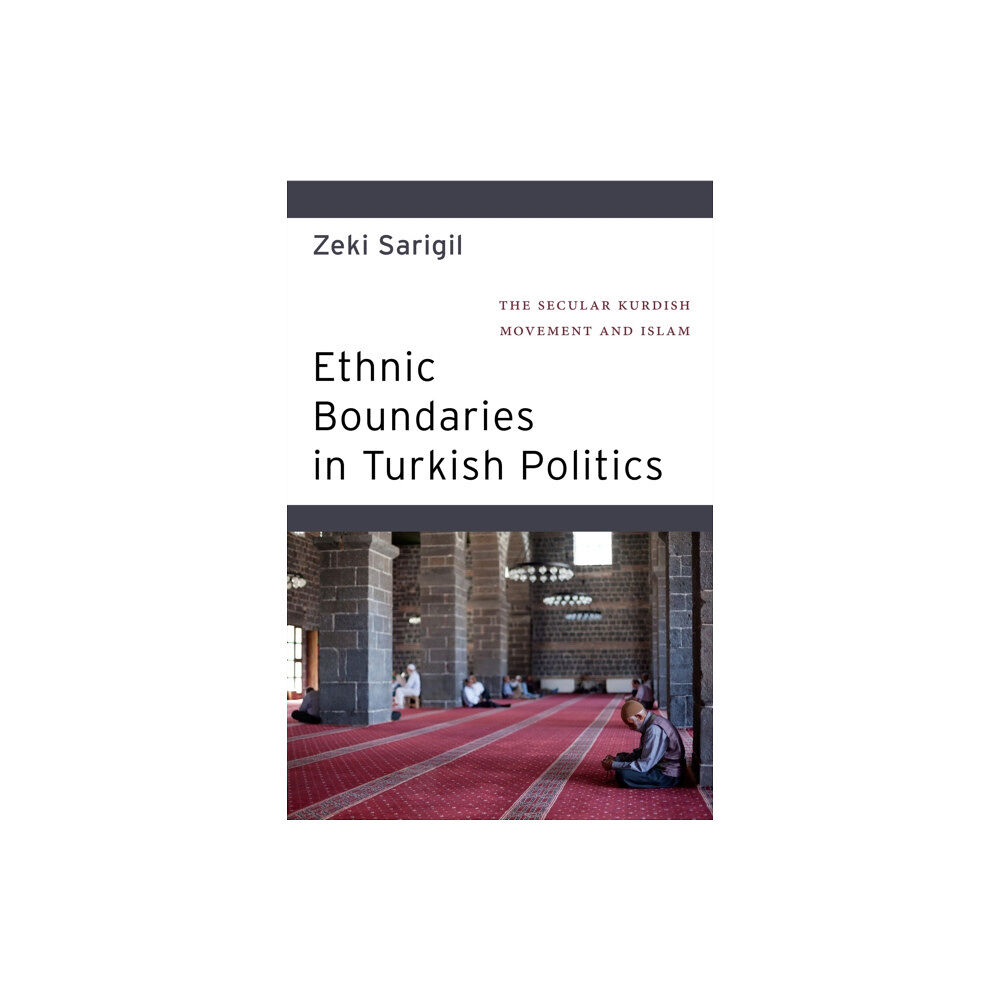- Hem
- Böcker
- Kurslitteratur
- Historia
- Ethnic Boundaries in Turkish Politics (inbunden, eng)

Ethnic Boundaries in Turkish Politics (inbunden, eng)
The Kurdish Movement in Turkey’s growing alliance with Islam One of the fault lines of Turkish politics traditionally has been the divide be...
169 kr
199 kr
Bara 2 kvar
Skickas inom 2-3 vardagar
Fri frakt över 299:-
Snabb leverans
Alltid låga priser
Produktbeskrivning
The Kurdish Movement in Turkey’s growing alliance with Islam One of the fault lines of Turkish politics traditionally has been the divide between religious and secular movements. However, as Zeki Sarigil argues, the secular Kurdish movement in Turkey has increasingly become aligned with Islam.
As a result, Islam has become part of the movement’s political discourse, strategies and actions. Ethnic Boundaries in Turkish Politics traces the evolving relations between the leftist, secular Kurdish movement and Islam, from an apathetic and/or antagonistic attitude in the 1970s and 1980s to an increasingly Islam-friendly approach in the 1990s to an attitude of accommodation and the rise of Kurdish-Islamic synthesis in the early 2000s.
Based on 104 interviews in several provinces in Turkey (primarily Ankara, Diyarbakir, Istanbul, and Tunceli) between 2011 and 2015 as well as ethnographic data, public opinion surveys and statements from the Kurdistan Workers’ Party (PKK) and Kurdish leaders, Sarigil shows how the secular Kurdish movement increasingly has been endorsing Islam and Islamic actors.
The reasons for this Islamic opening are global, national, and local; Sarigil demonstrates that a group of strategic and ideological factors have encouraged and/or forced Kurdish leaders to redraw symbolic and social boundaries of the movement. Namely, with the end of the Cold War support for Marxist ideas collapsed, creating increasingly more favorable responses towards religion.
In addition, the movement’s need to expand its social basis and popularity; electoral politics; and legitimacy struggles against rival political actors were other major factors, which triggered the Kurdish movement’s boundary expansion (i.e. its Islamic opening). The study also shows that the Kurdish boundary making was not without any tension or contestation.
The boundary expansion by Kurdish ethnopolitical elites triggered both internal and external boundary contestations. The movement’s embrace of Islam on a more widespread level has major ramifications for politics in Turkey and in the region. Ethnic Boundaries in Turkish Politics has important insight into the PKK, modern Turkish and Islamic societies and highlights the increasing role of Islam in global politics.
As a result, Islam has become part of the movement’s political discourse, strategies and actions. Ethnic Boundaries in Turkish Politics traces the evolving relations between the leftist, secular Kurdish movement and Islam, from an apathetic and/or antagonistic attitude in the 1970s and 1980s to an increasingly Islam-friendly approach in the 1990s to an attitude of accommodation and the rise of Kurdish-Islamic synthesis in the early 2000s.
Based on 104 interviews in several provinces in Turkey (primarily Ankara, Diyarbakir, Istanbul, and Tunceli) between 2011 and 2015 as well as ethnographic data, public opinion surveys and statements from the Kurdistan Workers’ Party (PKK) and Kurdish leaders, Sarigil shows how the secular Kurdish movement increasingly has been endorsing Islam and Islamic actors.
The reasons for this Islamic opening are global, national, and local; Sarigil demonstrates that a group of strategic and ideological factors have encouraged and/or forced Kurdish leaders to redraw symbolic and social boundaries of the movement. Namely, with the end of the Cold War support for Marxist ideas collapsed, creating increasingly more favorable responses towards religion.
In addition, the movement’s need to expand its social basis and popularity; electoral politics; and legitimacy struggles against rival political actors were other major factors, which triggered the Kurdish movement’s boundary expansion (i.e. its Islamic opening). The study also shows that the Kurdish boundary making was not without any tension or contestation.
The boundary expansion by Kurdish ethnopolitical elites triggered both internal and external boundary contestations. The movement’s embrace of Islam on a more widespread level has major ramifications for politics in Turkey and in the region. Ethnic Boundaries in Turkish Politics has important insight into the PKK, modern Turkish and Islamic societies and highlights the increasing role of Islam in global politics.
| Format | Inbunden |
| Omfång | 208 sidor |
| Språk | Engelska |
| Förlag | New York University Press |
| Utgivningsdatum | 2018-09-04 |
| ISBN | 9781479882168 |
Specifikation
Böcker
- Inbunden, 208, Engelska, New York University Press, 2018-09-04, 9781479882168
Leverans
Vi erbjuder flera smidiga leveransalternativ beroende på ditt postnummer, såsom Budbee Box, Early Bird, Instabox och DB Schenker. Vid köp över 299 kr är leveransen kostnadsfri, annars tillkommer en fraktavgift från 29 kr. Välj det alternativ som passar dig bäst för en bekväm leverans.
Betalning
Du kan betala tryggt och enkelt via Avarda med flera alternativ: Swish för snabb betalning, kortbetalning med VISA eller MasterCard, faktura med 30 dagars betalningstid, eller konto för flexibel delbetalning.
Specifikation
Böcker
- Format Inbunden
- Antal sidor 208
- Språk Engelska
- Förlag New York University Press
- Utgivningsdatum 2018-09-04
- ISBN 9781479882168
